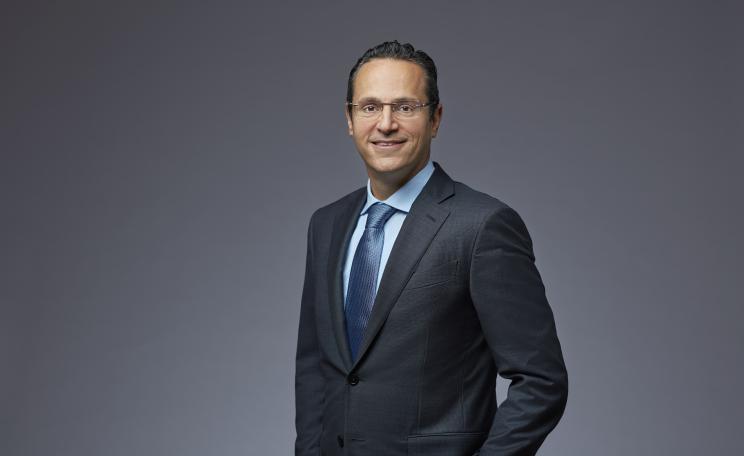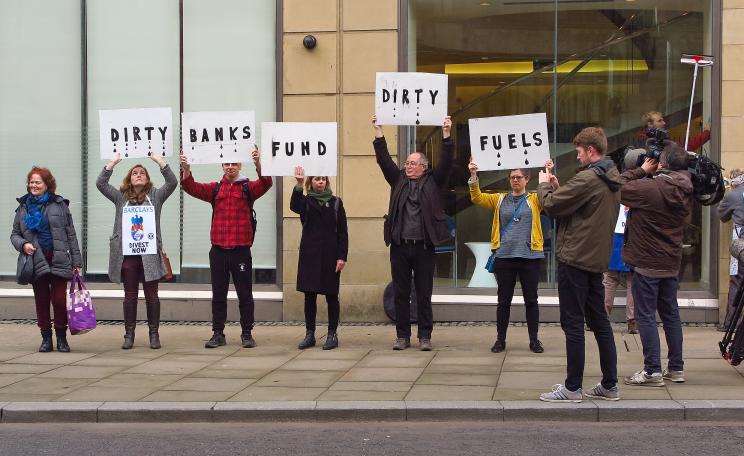Who kills the climate? Shell kills the climate.
Shell’s chairman was accused of greenwashing as he addressed shareholders at the oil giant’s annual general meeting (AGM).
Sir Andrew MacKenzie was interrupted by protesters as he opened the gathering at the InterContinental London – The O2 hotel on Tuesday.
Dozens of people stood up and began performing a rendition of the Dolly Parton song Jolene, singing “Shell kills, Shell kills, Shell kills, Shell kills”.
Transition
As security staff carried protesters out of the meeting room, they chanted: “Who kills the climate? Shell kills the climate.”
Four people could be seen shouting and linking arms to make it harder for security to remove them.
Before the meeting, a crowd of demonstrators gathered outside the hotel, erecting large signs reading: “Shell profits kill” and “Your greed is killing humanity” as a protester made speeches through a megaphone.
Sir Andrew began his opening remarks by defending the company’s stance on climate, emphasising the goal to be net zero by 2050 and how Shell believes the energy system will transition.
It comes after Shell scaled back its short-term and medium-term targets, weakening a 2030 carbon reduction target and ditching a plan to reduce oil production by one per cent to two per cent each year for the rest of the decade.
Resolutions
The approach is part of new chief executive Wael Sawan’s strategy to focus on higher-margin projects, steady oil output, and growth in the production of natural gas to increase payouts to shareholders.
Sir Andrew told shareholders: “The speed and shape of change can be huge and people often over-estimate this in the short term but under-estimate what can change in the long term.
“While it might be tempting to stop using oil and gas before the world is ready, we must not do so at the expense of the energy needs and aspirations of the global populations.”
As soon as his speech ended, a protester stood up and shouted: “That’s all greenwash.”
The AGM has been dominated by debates around Shell’s climate strategy as shareholders prepare to vote on two resolutions focused on its strategy.
Investors
Shell has put forward a management proposal requesting investors’ approval of the updated energy transition strategy, which features the less ambitious emissions reduction targets than its previous strategy.
A record 27 institutional shareholders have co-filed a resolution, led by Dutch campaign group Follow This, asking for the company to align its Scope 3 emissions with the Paris Climate Agreement goals.
Last year, the board faced a shareholder rebellion when 20 per cent voted against it on both proposals.
Proxy advisory firms Glass Lewis and ISS have advised investors to vote against the shareholder resolution while Pirc has recommended they support it.
Aligned
Later in the same meeting more than a fifth of shareholder votes were cast against Shell’s climate strategy. A resolution to approve the current strategy saw 21.8 per cent of shareholder votes going against management.
Who kills the climate? Shell kills the climate.
Nearly a fifth of the votes backed a resolution from Dutch activist group Follow This, which called on the board to align decarbonisation targets with the goals of the Paris Agreement.
Mark van Baal, founder of Follow This, challenged the board about its environmental impact. He said: “Dear shareholders, get a load of this. The world has pledged to halve emissions by 2030 and your company has no plans to further reduce emissions this decade.”
He asked the board: “Can you explain how Shell can be Paris-aligned without reducing emissions up to 2030, without using the word ‘believe’?”
In response, Mr Sawan argued Shell is “very much aligned with achieving a 2050 net zero outcome” and said the firm is using the most ambitious scenarios under the Intergovernmental Panel on Climate Change assessment report.
Hassled
Responding to the vote for the resolution after the meeting, Mr van Baal said: “Votes for this climate resolution show which investors are committed to Paris and which investors endorse Big Oil’s refusal to take meaningful climate action.”
Later in the meeting, a woman addressed the board about Shell’s alleged human rights abuses and environmental destruction in the Niger Delta.
After speaking for a few minutes, Sir Andrew said she had gone over her allotted two minutes and security staff swarmed the woman, asking her to leave.
Sir Andrew intervened, allowing her to continue but she grew tearful as she questioned why security had hassled her and who was going to clear up the pollution in the Niger Delta that has cost lives after Shell sells its majority stake in the local operator.
Uncomfortable
A fellow shareholder confronted the board and highlighted that the one shareholder who was surrounded by security for speaking longer than two minutes was a young woman of colour.
“(It) makes me, as a shareholder, very uncomfortable, and I hope that it makes the board feel uncomfortable and fellow shareholders,” she said.
In response, Sir Andrew said there are processes in place to ensure security, adding: “I’m sorry it didn’t occur in the right way.”
A Shell spokesperson said: “We respect people’s right to express their point of view and welcome any constructive engagement on our strategy and the energy transition."
This Author
Rebecca Speare-Cole is the PA sustainability reporter.







